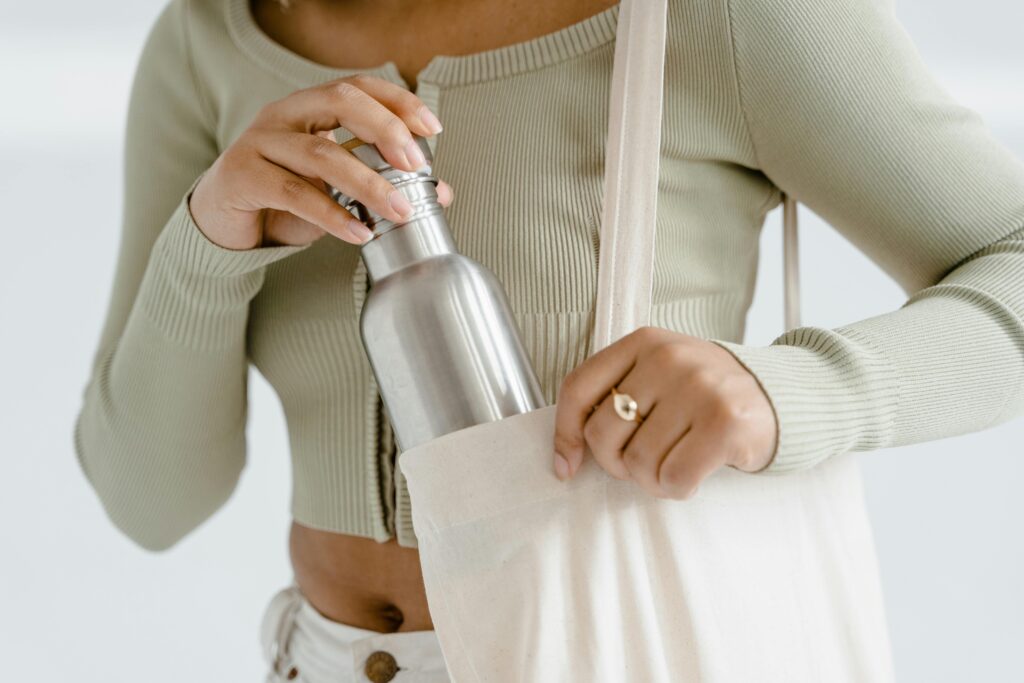There has been a lot of talk about microplastics lately. These tiny plastic particles (measuring less than 5 millimeters in size), have become a pressing environmental and health concern that is making headlines. They are found in oceans, soil, food, and even drinking water.
While completely avoiding microplastics is challenging, there are steps you can take to reduce your exposure. Here are some practical tips for avoiding microplastics in daily life.

Reduce Single-Use Plastics
Plastic packaging, utensils, and containers often degrade into microplastics over time. Avoid single-use plastics by using reusable bags, bottles, and food storage containers made from glass, stainless steel, or silicone.
Choose Natural Fibers
Synthetic fabrics like polyester and nylon shed microplastics with every wash. Looks for clothing and textiles made from natural fibers such as cotton, wool, or linen. These materials do not contribute to microplastic pollution during laundering.
Use a Microfiber Filter
When washing synthetic clothing, consider installing a microfiber filter on your washing machine or using a laundry bag designed to capture microfibers. These tools can help prevent microplastics from entering wastewater systems.
Avoid Products with Microbeads
Microbeads are banned in the US, and were often found in exfoliating scrubs, toothpaste, and body washes. If you live in a country that has not yet banned microbeads, look for alternatives, such as biodegradable exfoliants like sugar, salt, or coffee grounds.
Filter Your Water
Microplastics can be present in tap water. Invest in a high-quality water filter that has the ability to remove microplastics, such as those with reverse osmosis or carbon block technology.
Be Mindful of Food Packaging
Plastics used in food packaging can leach microplastics into your food, particularly when exposed to heat. Store food in non-plastic containers and avoid microwaving meals in plastic packaging. Fresh, unpackaged foods are your best bet.
Toss Your Plastic Cutting Boards
By making these conscious choices, you can significantly reduce your exposure to microplastics while contributing to a healthier planet. Small, consistent actions in daily life can help protect both your well-being and the environment.






Thank you so much for sharing this! I’ve been trying to mitigate my exposure to plastic and use as little of it as possible. I read that plastic is probably in my organs at this point.
I am really worried about microplastics, so thanks for this useful advice. These are some great tips to try and reduce consumption of them.
Solid advice here. Reducing microplastics is easier than expected with small, mindful changes in daily habits. Every step counts.
This is such a big issue in our house right now! Our baby keeps licking on her jumpers and I know that some will contain microplastics. This is so helpful to read!
We got rid of our plastic cutting boards ages ago! I cannot believe people still use those.
Since I read that single-use plastics are the biggest contributors to microplastics, we stopped using them completely.
I’ve been meaning to grab those glass containers. I’ve been using plastic containers for leftovers and I think it’s time for a change.
These are such helpful tips! It’s crazy how microplastics are everywhere. Simple changes can really make a difference.
This was a very informative post. I hadn’t realized that synthetic fabrics like polyester and nylon shed microplastics.
Good to know.
I think these are great tips for reducing microplastic exposure. The simple swaps like using glass containers and choosing natural fabrics can make a big difference for both health and the environment.
I didn’t know that installing a microfiber filter in a washing machine can stop microplastics entering water systems. I’m not sure if it is something doable for us, but the alternative of using a special laundry bag might be easier to put into action.
Yeah… this is so crazy and cannot imagine how much has gone into so many peoples bodies already. I heard if you drink from bottles water bottles you are consuming them and that the average person drinks a credit cards worth of plastic each week….. and the thought of that is terrifying. I so appreciate this list and will cut out all plastics that can contribute to this.
It’s crazy how microplastics are everywhere. It’s good to see more practical tips for avoiding them in daily life.
These are some great tips on avoiding microplastics!! Not every everybody is aware of this, so thanks for bringing awareness to it!
Love these tips! Especially the microfiber filter for the washing machine. Definitely have to look into that.
Thanks for these helpful tips. Yes microplastics are everywhere. And we make sure we avoid plastic where we can.
Microplastics is often in my mind hence I try to buy glass bottled products and use reusable good quality tupperware as much as I can. It is so scary to see how much of microplastics is out there and what harm it can do to us